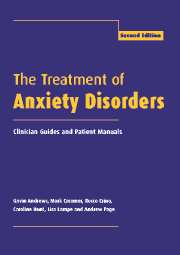Book contents
- Frontmatter
- Contents
- List of authors
- Preface to the second edition
- Abbreviations
- 1 Read me
- 2 General issues in anxiety disorders
- 3 General issues in treatment: Clinician Guide
- 4 Panic disorder and agoraphobia: Syndrome
- 5 Panic disorder and agoraphobia: Treatment
- 6 Panic disorder and agoraphobia: Clinician Guide
- 7 Panic disorder and agoraphobia: Patient Treatment Manual
- 8 Social phobia: Syndrome
- 9 Social phobia: Treatment
- 10 Social phobia: Clinician Guide
- 11 Social phobia: Patient Treatment Manual
- 12 Specific phobias: Syndrome
- 13 Specific phobias: Treatment
- 14 Specific phobias: Clinician Guide
- 15 Specific phobias: Patient Treatment Manual
- 16 Obsessive-compulsive disorder: Syndrome
- 17 Obsessive-compulsive disorder: Treatment
- 18 Obsessive-compulsive disorder: Clinician Guide
- 19 Obsessive-compulsive disorder: Patient Treatment Manual
- 20 Generalized anxiety disorder: Syndrome
- 21 Generalized anxiety disorder: Treatment
- 22 Generalized anxiety disorder: Clinician Guide
- 23 Generalized anxiety disorder: Patient Treatment Manual
- 24 Posttraumatic stress disorder: Syndrome
- 25 Posttraumatic stress disorder: Treatment
- 26 Posttraumatic stress disorder: Clinician Guide
- 27 Posttraumatic stress disorder: Patient Treatment Manual
- 28 Conclusions
- References
- Index
18 - Obsessive-compulsive disorder: Clinician Guide
Published online by Cambridge University Press: 05 August 2016
- Frontmatter
- Contents
- List of authors
- Preface to the second edition
- Abbreviations
- 1 Read me
- 2 General issues in anxiety disorders
- 3 General issues in treatment: Clinician Guide
- 4 Panic disorder and agoraphobia: Syndrome
- 5 Panic disorder and agoraphobia: Treatment
- 6 Panic disorder and agoraphobia: Clinician Guide
- 7 Panic disorder and agoraphobia: Patient Treatment Manual
- 8 Social phobia: Syndrome
- 9 Social phobia: Treatment
- 10 Social phobia: Clinician Guide
- 11 Social phobia: Patient Treatment Manual
- 12 Specific phobias: Syndrome
- 13 Specific phobias: Treatment
- 14 Specific phobias: Clinician Guide
- 15 Specific phobias: Patient Treatment Manual
- 16 Obsessive-compulsive disorder: Syndrome
- 17 Obsessive-compulsive disorder: Treatment
- 18 Obsessive-compulsive disorder: Clinician Guide
- 19 Obsessive-compulsive disorder: Patient Treatment Manual
- 20 Generalized anxiety disorder: Syndrome
- 21 Generalized anxiety disorder: Treatment
- 22 Generalized anxiety disorder: Clinician Guide
- 23 Generalized anxiety disorder: Patient Treatment Manual
- 24 Posttraumatic stress disorder: Syndrome
- 25 Posttraumatic stress disorder: Treatment
- 26 Posttraumatic stress disorder: Clinician Guide
- 27 Posttraumatic stress disorder: Patient Treatment Manual
- 28 Conclusions
- References
- Index
Summary
The principles of exposure and response prevention are relatively straightforward. Rarely are there any major difficulties in their application as long as the groundwork is completed competently. However, as noted by Marks et al. (1975), “This treatment requires a good patient–therapist working relationship, and a sense of humor helps patients over difficult situations.” The cognitive techniques that can be used to supplement the exposure-based treatment are not as straightforward as the behavioral procedures, and require some level of expertise in the use of cognitive therapy. Often, patients report that previous treatment has involved clinicians attempting to challenge the rationality of the intrusive thought itself. Needless to say, such an approach has led to difficulties, particularly as it is the appraisal of the intrusion that needs to be challenged rather than the intrusion itself. The following sections will refer to aspects of treatment and patient preparation that will facilitate the implementation of exposure and response prevention as well as address common difficulties in the application of these procedures in the treatment of obsessional disorders.
Common questions
Patients referred for treatment will often ask a number of questions about their condition and the proposed treatment. As much as possible, individuals are encouraged to ask questions, and answers are given on the basis of available knowledge regarding OCD. Common questions include those relating to the cause of their condition. Apart from discussing the research findings to date, it is pointed out that there is no one cause of OCD: it is not as simple as a “biochemical imbalance”, nor genes, nor individual psychological factors, nor environment but a complex condition due to a combination of a variety of complex factors. Educating the patient about OCD, its many causal factors and its treatment is an important step in bringing about a cognitive shift from the helpless attitude of many sufferers to having a good understanding of the condition, its maintaining factors, and what patients can do to assist in their own treatment.
Assessment
Perhaps the most important aspect of the cognitive behavioral treatment of OCD is the detailed assessment of the problem behaviors. Because of inadequate assessment, many difficulties commonly arise in the treatment of the condition.
- Type
- Chapter
- Information
- The Treatment of Anxiety DisordersClinician Guides and Patient Manuals, pp. 354 - 362Publisher: Cambridge University PressPrint publication year: 2002



